I Love returning to work after being overseas. Truly, I do, because I work with great people in a great company and we make exciting things happen. The trip overseas reminds me that we live in a great country with so much going for it – we have the best environment and climate, world leading living standards across the board with comparatively very little homelessness, good employment conditions, schools and hospitals etc.
So why are we all now whinging as much as the Poms about everything? We even take an average of 9 sick days against their 4.5 days, despite them living in a dreary climate ripe for colds and reasons to complain.
Because we’ve come to take it all for granted. And to maintain these standards, prices (and taxes) rise to meet the cost of providing it, which of course is unpopular. Here are some recent observations that give a different perspective:
Paid to do what?
I greatly dislike the Tipping Culture. But it does achieve one thing: higher pays to those that prove their worth to the customer, and a propensity to go the extra mile (even if it may be insincere from time to time). Not only do I struggle to work out what is “fair” each time, but I’m not sure that the people “behind the scenes” get recognition for their contributions.
In most overseas countries, there were many people employed in “menial” jobs. Here, we don’t accept that there are jobs like this that need doing. The most impressive positivity award goes to the Elevator operator: Pushing one of two elevator buttons all day, then smiling and saying the same spiel for every trip – that’s roughly 500 times each and every day (125,000 times in a year, they only get two weeks holiday…). Many of these roles add value, whilst some are more about giving purpose and a place in society. Yet here we accept using scarce Tax resources to pay people to do nothing. Unbelievable when you think about it.
Our Minimum Wage is currently $16.86 per hour. There was considerable chest thumping going on in Seattle when I was there that the Mayor had signed into law that the current Minimum Wage of $US9.32/hr ($AUD10) was going to increase to $15 in 7 years time, the highest in the nation… He acknowledged though that in the State of Washington it was only Seattle that may be able to afford it, the other cities won’t. At least he recognised that a country or indeed a company can afford to pay people more, but must be able to justify the cost differences and be able to pass them on. Can we justify pays that are 70% higher now than the worlds’ leading economy won’t even reach in 2020?
Technology is changing the world
The Rise of the Machines is taking place everywhere. We can choose to adopt technology that improves efficiency and productivity early and get a competitive advantage, or we can wait until the rest of the world is well under way already when we see jobs lost. So far, this trend has been noticeable in manufacturing, but the contagion is spreading at a rapid rate to service. If you think it can’t happen to you, Australian Customs now uses Facial/Body scan technology to check passports on re-entry, virtually removing human assessment. Many jobs previously thought of as “protected” are not.
Perspective is also important. In Alaska, one in three people owns a boat. As many places are inaccessible by road, that’s probably not too surprising. They used to use dog sleds not too long ago (they are very proud of their Iditarod and other sled races and tell me the dogs like it, but I’m not so sure – seems more like animal cruelty to me). Now, one in eight adults has a pilots license (and they know how to land in tight places). An incredible 1 in 22 owns their own seaplane. Here, a pilot’s license is uncommon, but when technology moves on, I guess you can grasp it, or be happy to spend weeks standing on a sled in blistering snow storms…
Good Luck to Small Business!
Our Federal Minister for Small Business, Honorary Bruce Billson, has started on an honourable crusade to support the engine room of Australia, Small and Medium businesses. Part of this was to get feedback on a Federal approach to make one point of contact for small business. I hope the Minister is tough enough to see through the responses to his discussion paper. 53 submission, about 30 from Industry associations (understandable), and only 5-6 from actual SME’s… Yes, the rest were from other Government Departments mostly hell bent on keeping the system complicated to retain their roles. SME’s tend to be too busy running our businesses within the complicated current framework to have time to submit. Further, the Discussion Paper contains its usual “Double Dutch” with Government complicating simple things so us “normal people” can’t work out what they are trying to achieve. SME’s shouldn’t complain about the outcomes if we can’t even bother providing input. I just hope the Minister is smart and tough enough to not get snow balled by vested interests that will make things more complicated for us, when it tried to achieve the opposite.
What are we going to do?
Thanks to a fair amount of Luck, we really didn’t have a GFC in Australia, and we don’t need to have one now either. It will however require a change of attitude from all of us. For the past decade, we have enjoyed tremendous prosperity, thanks to the spreading of wealth from a booming Mining sector that has helped lift the overall economy and wealth of all Australians through wage, property and profit increases unheralded elsewhere in the world. Most people dislike change and therefore fail to adapt, but unless we do accept that wealth won’t come as easily in the future (and work out a way of stopping it from being given away overseas), we will fail.
We need to adapt to the New Normal. Until Australia develops a Vision of what we want to be to the world, we can’t achieve it. Being the Raw Materials provider doesn’t cut it any more. Tourism hit the skids years ago and won’t fully recover in the near term – what’s new that we can offer the world? Manufacturing won’t expand either. Agriculture and some other areas have potential, but all are ham strung by Bureaucracy, an exorbitant cost environment, and a high exchange rate. Investing in Education for our people is all well and good (and I wish they’d make Personal Finances a curriculum subject), but this investment will take time and won’t achieve the objectives unless an environment to create new business opportunities is implemented. Consumer confidence is rising yet again, and business confidence could follow if there were clear signs that the issues that are presently making it difficult to conduct business are removed.
Good people and good businesses have nothing to worry about. Some segments and areas are weak, but overall we’ll come good as resources (people and capital) get transitioned through the economy to areas where they can get better use. We shouldn’t need to reflect on “the good old days” if we invite in “the golden opportunities”.
As always, onwards and upwards!
Fred Carlsson
General Manager



